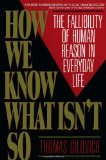| Value investors believe the market is not perfectly rational. To understand why, an examination of human behaviour is required. In How We Know What Isn’t So, which is recommended by a number of value investors and behavioural economists, Thomas Gilovich explores the fallibility of human reasoning. Only by understanding our flaws can we seek to improve on them, thereby ameliorating our decision-making processes. |
No matter what their circumstances, people tend not to want to trade places with others. Part of the reason for this is believed to be the notion that we overvalue our assets (e.g. objects we own, but also extending to our personality traits). The other part of the reason for this appears to be how we perceive ourselves; about ourselves, we believe what we prefer to be true.
It has been proved that most people believe they are more intelligent, fair-minded, better-looking, less-prejudiced and more skilled than the average person. Obviously, by the definition of “average”, all of these subjects cannot be correct.
According to Gilovich, a lot of these beliefs come from self-serving assessments. When we experience success, we attribute it to our actions and abilities. But when we experience failure, the root cause is blamed on an external factor we cannot control.
In such assessments, not only do we suffer from the biases discussed in the previous chapter, but we also explore negative information differently than we do positive (or pleasant to hear) information. For example, upon encountering failure, we look further and further for outside evidence that caused the failure; we don’t just stop looking for evidence if we don’t find it right away. For example, someone who has failed a test may first look for questions that were unfair. If they can’t find any, they may look for others who found the test unfair. They will keep this process up until they have found evidence that justifies the pre-ordained conclusion.
We also tend to skew the criteria in our favour whenever we make judgments. For example, the personality traits which we believe we exhibit ourselves are similar to those which we consider to be the most valuable human traits.




